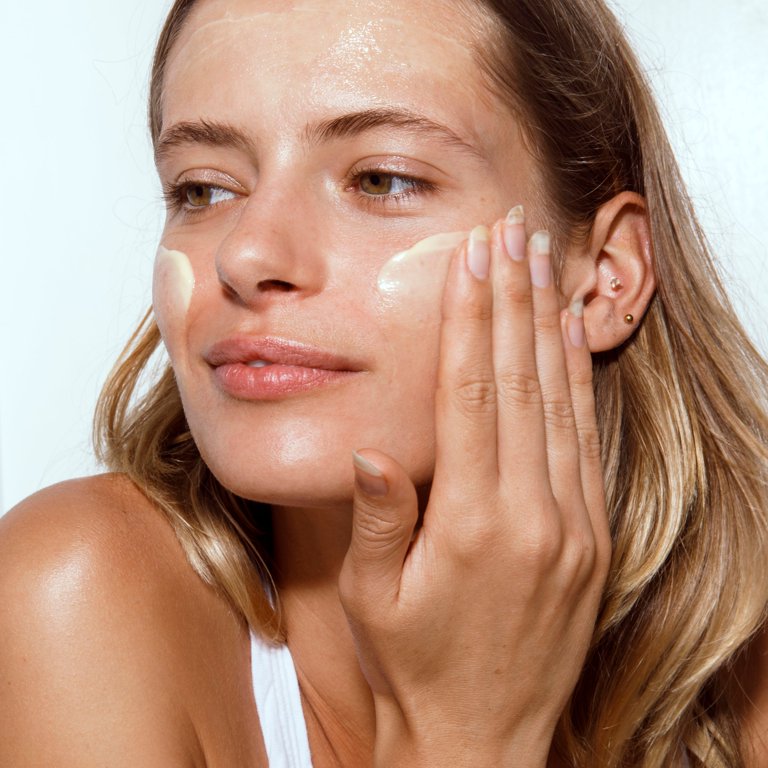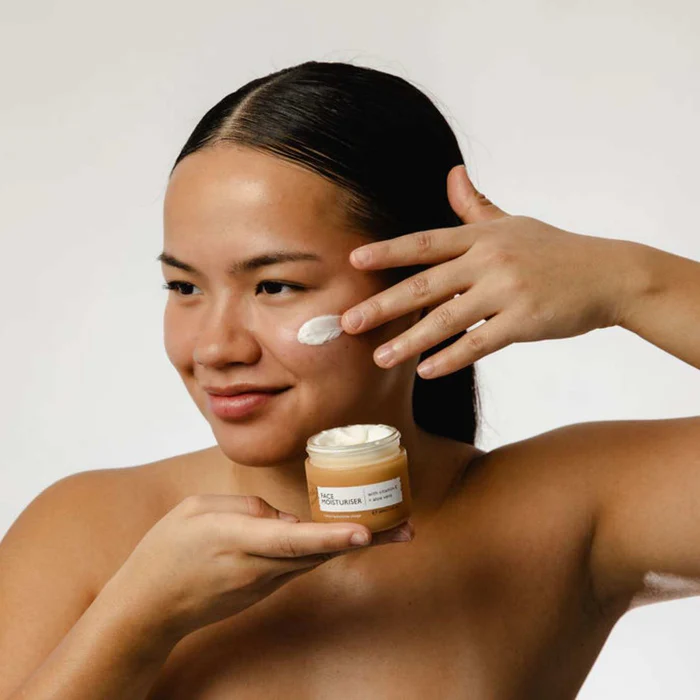
Best Face Lotion for Dry, Sensitive Skin
Understanding Dry, Sensitive Skin
Dry, sensitive skin requires special care and attention to maintain its health and appearance. This skin type often feels tight, itchy, and prone to redness or irritation. Various factors contribute to dry, sensitive skin, including genetics, environmental conditions, and skincare habits. Individuals with this skin type may experience flaking, roughness, and an increased sensitivity to skincare products. The skin’s natural barrier function is often compromised, leading to increased water loss and vulnerability to external irritants. Understanding the unique needs of dry, sensitive skin is crucial in selecting the right face lotion.
Ideal products should focus on hydration, barrier repair, and gentle, non-irritating formulations. Additionally, people with dry, sensitive skin should be aware of potential triggers, such as harsh weather conditions, hot showers, and certain skincare ingredients. Proper care for this skin type involves more than just applying lotion; it requires a holistic approach to skincare, including gentle cleansing, protection from environmental stressors, and consistent hydration. By recognizing the characteristics and needs of dry, sensitive skin, individuals can make informed choices about their skincare routine and select face lotions that provide optimal nourishment and comfort.

Key Ingredients for Dry, Sensitive Skin
Selecting the right face lotion for dry, sensitive skin hinges on understanding beneficial ingredients. Hyaluronic acid stands out as a powerful humectant, attracting and retaining moisture in the skin. This ingredient helps plump the skin and reduce the appearance of fine lines. Ceramides, naturally occurring lipids in the skin, play a crucial role in strengthening the skin barrier and preventing moisture loss. Glycerin, another effective humectant, draws water to the skin and helps maintain hydration. Niacinamide, a form of vitamin B3, soothes irritation and improves the skin’s barrier function. For sensitive skin, calming ingredients like aloe vera, chamomile, and allantoin can reduce redness and inflammation.
Antioxidants such as vitamin E and green tea extract protect the skin from environmental damage. Fatty acids, including omega-3 and omega-6, help nourish and repair the skin barrier. Gentle, non-comedogenic oils like jojoba, argan, or squalane provide hydration without clogging pores. Panthenol, or pro-vitamin B5, aids in skin healing and moisturization. When choosing a face lotion, look for products that combine several of these beneficial ingredients. Equally important is avoiding potential irritants such as fragrances, alcohol, and harsh preservatives. By focusing on these key ingredients, individuals with dry, sensitive skin can find face lotions that effectively hydrate, soothe, and protect their delicate complexions.
Top Face Lotions for Dry, Sensitive Skin
Several face lotions stand out for their effectiveness in treating dry, sensitive skin. CeraVe Moisturizing Cream tops many lists with its ceramide-rich formula, providing intense hydration and barrier repair. This fragrance-free lotion is suitable for both face and body, making it a versatile option. Another popular choice is Vanicream Moisturizing Cream, known for its gentle, non-irritating formula free from common allergens. La Roche-Posay Toleriane Double Repair Face Moisturizer offers a lightweight texture with ceramides and niacinamide, ideal for sensitive skin prone to redness.
For those seeking natural options, First Aid Beauty Ultra Repair Cream contains colloidal oatmeal and allantoin to soothe irritation while providing deep hydration. Neutrogena Hydro Boost Gel-Cream stands out for its oil-free, hyaluronic acid-rich formula, perfect for those who prefer a lighter texture. Aveeno Ultra-Calming Nourishing Night Cream combines oat extract and feverfew to calm sensitive skin while providing overnight moisture. EltaMD PM Therapy Facial Moisturizer offers a niacinamide-rich formula that supports the skin’s natural repair process. These top-rated lotions cater to various preferences and needs within the dry, sensitive skin category, providing options for different textures, ingredients, and price points.

Application Techniques for Maximum Benefit
Proper application of face lotion enhances its effectiveness for dry, sensitive skin. Start with clean, slightly damp skin to lock in extra moisture. Gently pat the skin dry with a soft towel, avoiding harsh rubbing that can irritate sensitive skin. Dispense a small amount of lotion onto fingertips and warm it slightly by rubbing hands together. This step helps the product spread more easily and absorb better. Apply the lotion using gentle, upward strokes, avoiding tugging or pulling at the skin. Pay special attention to particularly dry areas, such as around the nose and mouth. For extremely sensitive skin, try patting the lotion gently into the skin rather than rubbing.
Allow the lotion to absorb fully before applying any other products or makeup. Consider using slightly more product at night when the skin naturally repairs itself. For daytime use, follow up with a gentle, broad-spectrum sunscreen to protect sensitive skin from UV damage. Some individuals benefit from applying a facial oil or serum before their lotion for an extra boost of hydration. Consistency is key; apply the lotion twice daily for best results. During colder months or in dry climates, you may need to apply more frequently. Listen to your skin and adjust the amount and frequency of application as needed. By following these application techniques, individuals with dry, sensitive skin can maximize the benefits of their chosen face lotion and achieve optimal hydration and comfort.
Complementary Skincare Practices for Dry, Sensitive Skin
A comprehensive skincare routine supports the effectiveness of face lotions for dry, sensitive skin. Gentle cleansing forms the foundation of this routine. Opt for mild, fragrance-free cleansers that remove impurities without stripping the skin’s natural oils. Avoid hot water, which can further dry out the skin; instead, use lukewarm water for cleansing and rinsing. Consider incorporating a hydrating toner or essence to add an extra layer of moisture before applying face lotion. Weekly exfoliation with a gentle, enzyme-based exfoliant can help remove dead skin cells without irritating sensitive skin. However, avoid harsh scrubs or strong chemical exfoliants. Hydrating face masks, used once or twice a week, can provide an intensive moisture boost.
Look for masks containing soothing ingredients like aloe vera or chamomile. Protect sensitive skin from environmental stressors by wearing a broad-spectrum sunscreen daily, even on cloudy days. Consider using a humidifier in your living and sleeping spaces to add moisture to the air, particularly in dry climates or during winter months. Pay attention to your diet, as proper hydration and a balanced intake of healthy fats can support skin health from the inside out. Manage stress through relaxation techniques, as stress can exacerbate skin sensitivity. Be mindful of fabric choices, opting for soft, natural fibers that won’t irritate the skin. By incorporating these complementary practices, individuals can create a holistic skincare routine that supports and enhances the benefits of their chosen face lotion for dry, sensitive skin.

Common Mistakes to Avoid with Dry, Sensitive Skin
Several common mistakes can exacerbate issues for those with dry, sensitive skin. Overwashing ranks high on this list; cleansing too frequently or with harsh products strips the skin of its natural oils. Similarly, using water that’s too hot can damage the skin barrier and increase dryness and sensitivity. Another frequent error is applying skincare products in the wrong order; always apply water-based products before oil-based ones for optimal absorption. Many people with sensitive skin make the mistake of trying too many new products at once, making it difficult to identify potential irritants.
Skipping sunscreen is a critical error, as UV damage can worsen skin sensitivity and dryness. Some individuals mistakenly believe that oily or rich products are always better for dry skin, leading to clogged pores or increased sensitivity. Overexfoliating is another common pitfall; while gentle exfoliation can be beneficial, too much can damage the skin barrier. Neglecting to patch test new products can result in unexpected reactions. Many people underestimate the impact of lifestyle factors on skin health, such as poor diet, lack of sleep, or high stress levels. Finally, inconsistency in skincare routine can hinder progress in managing dry, sensitive skin. By avoiding these common mistakes, individuals can significantly improve the health and appearance of their dry, sensitive skin and enhance the effectiveness of their chosen face lotions.
Addressing Specific Concerns: Eczema, Rosacea, and Psoriasis
Dry, sensitive skin often accompanies specific skin conditions like eczema, rosacea, and psoriasis, each requiring tailored care. For eczema-prone skin, look for face lotions containing colloidal oatmeal or ceramides to soothe irritation and repair the skin barrier. Products approved by the National Eczema Association offer an extra level of assurance. Those with rosacea benefit from lotions with anti-inflammatory ingredients like niacinamide or green tea extract. Avoiding common rosacea triggers, such as alcohol and fragrance in skincare products, is crucial. For psoriasis, lotions containing salicylic acid or urea can help reduce scaling, while moisturizing ingredients combat dryness. In all cases, gentle, fragrance-free formulas are essential.
Individuals with these conditions should consult a dermatologist for personalized advice and potentially prescription treatments. Some may benefit from alternating between medicated treatments and gentle, hydrating lotions. Sun protection is particularly important for those with rosacea and psoriasis, as UV exposure can trigger flare-ups. Patch testing new products is especially crucial for those with these conditions to avoid potential irritation. Keeping a skincare diary can help identify triggers and track the effectiveness of different products. By addressing these specific concerns with targeted skincare approaches, individuals can better manage their dry, sensitive skin alongside these conditions.
Natural and DIY Options for Dry, Sensitive Skin
Natural and DIY face lotions offer alternatives for those seeking to avoid synthetic ingredients. Aloe vera gel stands out as a natural moisturizer with soothing properties, ideal for sensitive skin. Raw honey, known for its humectant and antibacterial qualities, can be mixed with other natural ingredients to create nourishing face masks. Coconut oil, while too heavy for some, provides intense moisture and has anti-inflammatory properties. Oatmeal, when finely ground, can be mixed with water or milk to create a soothing, moisturizing mask. Avocado, rich in healthy fats and vitamins, makes an excellent base for homemade face lotions.
Cucumber, with its high water content and cooling properties, can be blended into refreshing, hydrating masks. Shea butter offers intense moisture and can be whipped with lighter oils for an easily absorbed lotion. Rosehip oil, rich in vitamins and essential fatty acids, provides hydration and potential anti-aging benefits. When creating DIY lotions, it’s crucial to use high-quality, organic ingredients and practice proper hygiene to avoid contamination. Always patch test homemade products before applying them to the entire face. While natural options can be effective, they may not be suitable for everyone, particularly those with severe skin conditions or allergies. It’s important to research ingredients thoroughly and consult with a dermatologist if unsure about their suitability for your skin type.

The Role of Lifestyle in Managing Dry, Sensitive Skin
Lifestyle factors play a significant role in managing dry, sensitive skin, complementing the effects of face lotions. Diet stands out as a crucial element; consuming foods rich in omega-3 fatty acids, such as salmon and walnuts, can help improve skin hydration from within. Staying well-hydrated by drinking plenty of water throughout the day supports overall skin health. Limiting alcohol and caffeine intake can also help, as these substances can be dehydrating.
Stress management is another key factor, as stress can exacerbate skin sensitivity and trigger inflammatory responses. Practices like meditation, yoga, or regular exercise can help reduce stress levels and improve skin health. Getting adequate sleep allows the skin time to repair and regenerate. Protecting the skin from environmental stressors is crucial; this includes wearing protective clothing and avoiding excessive sun exposure.
Maintaining a consistent skincare routine, even on busy days, helps keep dry, sensitive skin balanced. Being mindful of the indoor environment is important; using a humidifier can add moisture to dry air, especially during winter months or in air-conditioned spaces. Avoiding hot showers and baths, which can strip the skin of its natural oils, is also beneficial. By addressing these lifestyle factors, individuals can create a holistic approach to managing their dry, sensitive skin, enhancing the effectiveness of their chosen face lotions and overall skincare routine.
Future Trends in Skincare for Dry, Sensitive Skin
The skincare industry continually evolves, bringing new innovations for dry, sensitive skin. Personalized skincare is emerging as a significant trend, with companies offering customized formulations based on individual skin needs and environmental factors. Microbiome-focused skincare is gaining attention, with products designed to support the skin’s natural bacterial balance. Sustainable and eco-friendly options are becoming more prevalent, addressing consumer concerns about environmental impact.
Advanced delivery systems, such as nanoparticles and encapsulation technologies, promise more effective ingredient penetration and targeted treatment. Adaptogenic ingredients, known for helping the body resist stressors, are being incorporated into skincare formulations. Artificial intelligence and machine learning are being utilized to analyze skin conditions and recommend optimal products and routines.
Probiotic and prebiotic skincare continues to gain traction, offering potential benefits for sensitive skin types. Blue light protection is emerging as a concern, with products designed to shield the skin from digital device emissions. Plant stem cell technology is advancing, offering new possibilities for skin regeneration and repair. As research in skin biology progresses, we can expect more targeted solutions for specific skin concerns within the dry, sensitive skin category. These emerging trends promise exciting developments in the care of dry, sensitive skin, potentially offering more effective and personalized solutions in the future.

